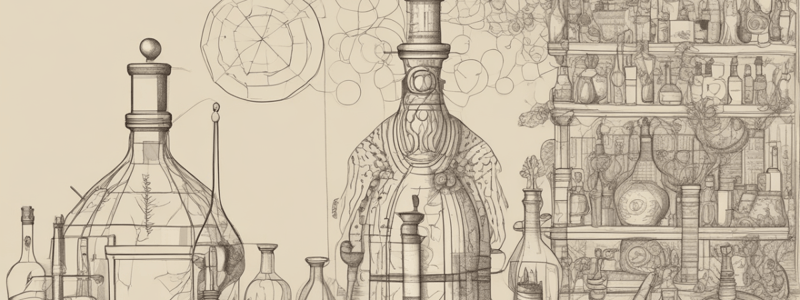Podcast
Questions and Answers
Who opposed Galen's teachings on blood regeneration?
Who opposed Galen's teachings on blood regeneration?
- Vesalius
- Paracelsus
- William Harvey (correct)
- Edward Jenner
What was the significance of William Harvey's discovery?
What was the significance of William Harvey's discovery?
- He discovered that blood is continuously pumped throughout the body (correct)
- He discovered the composition of substances
- He discovered the concept of vaccination
- He discovered the germ theory
What laid the foundation for modern understanding of the human body and composition of substances?
What laid the foundation for modern understanding of the human body and composition of substances?
- The work of Galen
- The work of William Harvey
- The work of Edward Jenner
- The work of Paracelsus, Vesalius, and others (correct)
What was the significance of Edward Jenner's discovery?
What was the significance of Edward Jenner's discovery?
What was the contribution of empiricism in the development of medicine and chemistry?
What was the contribution of empiricism in the development of medicine and chemistry?
What did Galen claim about blood?
What did Galen claim about blood?
What did William Harvey announce in his book On the Motion of the Heart?
What did William Harvey announce in his book On the Motion of the Heart?
What was the significance of the work of Paracelsus and Vesalius?
What was the significance of the work of Paracelsus and Vesalius?
What was the role of empiricism in the development of medicine and chemistry?
What was the role of empiricism in the development of medicine and chemistry?
What did the discovery of germ theory explain?
What did the discovery of germ theory explain?
Flashcards are hidden until you start studying
Study Notes
Medicine Before the Scientific Revolution
- Medicine was largely based on Galen's teachings, a 2nd-century Roman physician, who believed sickness was caused by imbalances in the four humors and temperaments of the body.
- Treatments during the Middle Ages were often primitive and detrimental, such as bloodletting, which was believed to cure illnesses caused by excess blood in the body.
- This practice was even used on President George Washington, potentially leading to his death in 1799.
Chemistry Before the Scientific Revolution
- People in the Middle Ages believed in the Aristotelian model, which stated that all substances were composed of four basic elements: fire, air, water, and earth.
- Alchemy was a prevalent pursuit, attempting to turn baser metals into gold or silver.
New Ideas: Paracelsus
- Paracelsus, a 16th-century Swiss-born chemist, favored experimentation and rejected Galen's theories, believing diseases were caused by 'bad seeds'.
- He publicly burned copies of Galen's work and advocated for a new approach to medicine.
New Ideas: Andreas Vesalius
- Vesalius, a Flemish contemporary of Paracelsus, made numerous discoveries about the human body through dissections.
- He correctly identified the human heart as having four chambers, contradicting Galen's claim of two chambers.
- Vesalius created the world's first medical textbook, De Humani Corporis Fabrica, in 1543.
New Ideas: Iatrochemists
- Iatrochemists focused on preparing substances and solutions in the purest way possible, making extensive notes on their experiments.
- They consulted and released their findings across the early modern scientific world.
New Ideas: Robert Boyle
- Robert Boyle, an Irish-born chemist, was an empiricist who believed only in experimentation-based knowledge.
- He is famous for discovering Boyle's Law, which states that the volume of a gas varies inversely with pressure.
New Ideas: William Harvey
- William Harvey, an English physician, announced his discovery that blood was continuously pumped throughout the body by the heart.
- He discovered that the body contained a fixed amount of blood, contradicting Galen's teachings.
Medicine and Chemistry Moving Forward
- The work of early physicians and chemists laid the foundation for modern understanding of the human body and composition of substances.
- Later achievements, such as vaccination and germ theory, were built upon the empiricism pioneered by these early scientists.
Studying That Suits You
Use AI to generate personalized quizzes and flashcards to suit your learning preferences.




